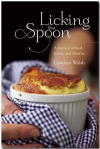I’ve been on a memoir reading binge lately. Every time I turned around there seemed to be another lesbian memoir demanding my attention. Below is a list of my recent reads. Though they range in time (the 1950s to the present day) and place (the LES to North Dakota), the issues these women grapple with are the same: coming out, coming into her own, breaking through silences, establishing relationships, becoming the subject of her own story—which is all we can all only strive for, really.
Happy reading.
 Riding Fury Home by Chana Wilson
Riding Fury Home by Chana Wilson
A powerful mother-daughter memoir, contrasting the heart breaking, soul crushing experience of Wilson’s mother (until the women’s movement!) with Wilson’s own coming out. I wished her mom had written a book, but if this is the closest we’ll get, I’ll take it.
 My Awesome Place by Cheryl Burke
My Awesome Place by Cheryl Burke
A survival story—from family dysfunction, drinking, and drugs to poet and powerhouse.

My Almost Certainly Real Imaginary Jesus by Kelly Barth
If you’ve been raised a certain way and defined by those beliefs, what do you do when you no longer belong? Who are you then? Barth stumbled and struggled down this long, twisty road and it is entirely worth it. Rejecting a particular religious doctrine is only the first step; finding a new theology and a community is just as important and harrowing.
Licking the Spoon by Candace Walsh
Food memoirs always have a place at my table and I really wanted to love this one more. It started out strong for me but as the author comes to terms with her sexuality, leaves her husband, and finds love again, I found myself skimming pages—and missing the food.
 Prairie Silence by Melanie Hoffert
Prairie Silence by Melanie Hoffert
Maybe it’s just because I live in New York, but I think I’ve burnt out on the coming of age memoir on the wild streets of NYC in the 1950s/60s/70s/80s/90s. The winds of the North Dakota plains were very welcome here and Hoffert’s poignant sketch of rural life, coming out—and going back home—is a welcome new voice.




















